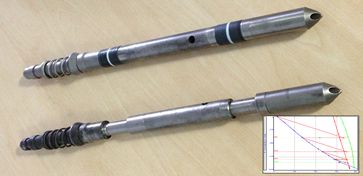Course Details
Home / Public Courses / Course Details
ONLINE: Gas Lift Systems Design, Operation and Optimisation (PRE931)
Description
This course covers the design, operation, diagnosis and optimisation of gas lift systems including a review of gas lift equipment, valve operation and the unloading process. You will gain an appreciation of the key concepts involved in the application of gas lift methods and a practical understanding of their operation and optimisation. Well modelling software will be used to illustrate design and troubleshooting applications while network modelling software will illustrate gas lift gas allocation and field wide optimisation techniques.
Course Structure: 12 modules of 1½ hours each, delivered over 4 days
Each day will consist of 3 modules, split into units of 1½ hours, with multiple breaks.
Course Level: Foundation / Skill
Duration: 4 days
Instructor: Alastair Baillie
Course Structure: 12 modules of 1½ hours each, delivered over 4 days
Each day will consist of 3 modules, split into units of 1½ hours, with multiple breaks.
Course Level: Foundation / Skill
Duration: 4 days
Instructor: Alastair Baillie

Designed for you, if you are...
- Petroleum engineering or field staff involved in the selection, design, operation or troubleshooting of gas lift systems
How we build your confidence
- Combination of live instructor-led training coupled with self-directed learning, live Q&A sessions and group discussions
The benefits from attending
The objectives of the course will be to enable participants to:- Become familiar with gas lift methods, concepts of operation and equipment
- Perform gas lift design procedures for new or existing wells
- Recognise the correct data required for well analysis and troubleshooting
- Diagnose and troubleshoot gas lift well performance
- Optimise the gas lift system for production and long term reliability
Topics
Gas lift systems concepts and equipment- Introductions and course objectives
- Review and recap of well and reservoir performance fundamentals; oil composition and fluid characterisation
- Gas lift introduction; concepts and theory, gas lift performance curves and depth of injection
- Pressure gradient traverse plots and generation using multiphase flow correlations
- Gas lift equipment overview; gas lift valve operation and equations; installation and removal
- Teardown and inspection of gas lift equipment; well integrity issues
- Gas lift references and resources
- Practical workshop session; gas lift valve hand calculations
Gas lift systems design
- Gas lift design overview (conceptual vs. detailed) and principles
- Generating 4 variable lift curves for gas lift wells
- Practical workshop session; conceptual gas lift design
- Gas lift unloading process and key factors to ensure success
- Consideration of safety factors for mandrel spacing and valves operation
- Detailed gas lift design procedure for continuous gas lift wells; special applications
- Practical workshop session; conceptual and detailed gas lift design and exporting VLPs
Gas lift systems diagnosis, practical troubleshooting and optimisation
- Gas lift operations, monitoring and procedure for unloading a new well
- Gas lift diagnosis and troubleshooting; key concepts and procedure for analysis
- Flowing gradient survey interpretation and matching; determination of injection depth, orifice pressure drop, etc.
- Practical workshop sessions; building and matching of well models using field data
- Practical workshop sessions; gas lift well diagnosis using gradient traverse plots with field data
- Dealing with problem wells (instability, slugging, multi-point injection etc.)
- Re-design of a gas lift valve setting for an existing well to address these problems
- Practical workshop session; gas lift well re-design using existing mandrels with field data
- Introduction to surface network modelling; well performance curves, interactions between wells and pipelines
- Shortage of gas supply; gas-lift allocation concepts & multi-well optimisation techniques
- Practical workshop session; building a wellhead platform model with field data
- Matching field performance and running gas lift gas allocation sensitivities
- Review, conclusions and evaluation form completion
Note:
Each day will include practical workshop sessions illustrating the application of theory to gas-lift well models. Participants are encouraged to bring field data and examples to interpret and analyse.
Workshop / In-House Presentations:
During the 4-day session the instructor would aim to use client’s well data throughout and participants should be able to build, validate and diagnose their own wells. So each day will include practical workshop exercises using commercial software.
The course is designed to be highly interactive and the instructor is always open to answering questions as they arise.
© All rights reserved
HOT Engineering GmbH Tel: +43 3842 43 0 53-0 Fax +43 3842 43 0 53-1 hot@hoteng.com
